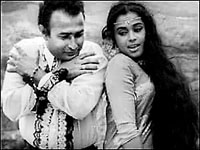Columns
MALANI: The legend will linger on but will the Malima allure survive?
View(s):- Minister’s wanton reference 5 months ago, provokes public fury on her death
- SUNDAY PUNCH TRIBUTE TO THE KOHINOOR DIADEM OF SINHALA CINEMA
It was the family funeral of the nation that people, engulfed in tears of sorrow, mourned in black and white upon hearing the breaking news last Saturday, that the queen of Sinhala cinema, Malani Fonseka, had passed away that early morn.
Some broke down in a flood of tears, while some were too distraught to cry and stayed benumbed in disbelief that the Goddess of the Sinhala screen, who had lived enshrined in their hearts, had bid her last farewell and taken the last curtain call.
With the shrine deserted, where would they lay anymore the flowers that bloomed for her each morn but at the mausoleum that the people would build, like Shah Jahan built the Taj Mahal for his wife Mumtaz, in the marbled memory of the nation’s heart?
The love with which the nation held her and the grief which her demise had wrought were hued in red in the eyes of those that lined the queues to pay their last respects and take one final glimpse of the star who dazzled brightest in cinematic skies and enthralled, for over fifty years, three generations of Lankans, on stage and on the silver screen.
They came in endless streams to the National Film Corporation’s Tharanga Hall, where her mortal remains peacefully lay—at the end of a life journey of seventy-eight years—awaiting the
consuming flames.
Her journey began in Kelaniya, where she was born in the same year that the Sinhala cinema, which she was destined to rule as its undisputed queen, was born. Whilst attending the village school, Gurukula, which was near the Kelani campus, her dance teacher received an urgent plea from campus staff. They were staging a play but had no one to play the female lead role.
Malani had shown an early promise of dancing skills on stage. This had led her to dance and act in many a school play. Her dancing and her acting prowess hadn’t gone unnoticed by her teachers. On receiving the campus plea, her dance teacher asked Malani whether she could oblige; she replied, ‘I will ask my parents and will let you know.’

SCREEN GODDESS MALANI FONSEKA: Making her screen debut in ‘PUNCHI BABA’ at 21
With parental consent obtained, the boards of the campus stage were first to bear and hear the tread of Malani’s feet as she made her first public appearance on it, playing, while still a schoolgirl, the lead female role in the play, ‘Noratha Ratha’. Recalling the moment in 2010, she said, ‘I never dreamt any ‘dream’ of becoming an actress, leave alone making a mark in Sri Lankan cinema. It so happened that I became an actress through the stage play ‘Noratha Ratha’. It led me on to the movies.’
Hardly out of her stage bassinet at the age of 21, destiny laid the coming-of-age key in the young stage actress’s hands. The key unlocked the glamorous world of Sinhala cinema and brought her her first film role, to star in the aptly named film ‘Punchi Baba’.
When the film was released in 1968, it became apparent to those in the film industry and to screen buffs alike that a hitherto unknown star had wandered into their ken; a star, from god knows where, had suddenly appeared in the film firmament and shone so bright as to set the Lankan hemisphere ablaze.
‘Punchi Baba’ set Malani on the road to stardom. With her maiden appearance in the film causing such a sensation, she had taken the film industry by storm. Film producers and directors were banging on her door, offering her leading roles in films still to roll.

SCREEN LOVERS: Malani with Gamini in 17 films
Films followed films, and success followed success, cementing Malini Fonseka’s position as Sinhala cinema’s number one star. Her films became major box office hits, and the demand never waned for more of the same.
To name but a few memorable films out of the numerous ones in which she appeared, were Hathara Denama Soorayo, Eya Dan Loku Lamayek, Bambaru Avith, Baddegama and Thushara. Playing the role of a lover, she flitted from the arms of Gamini to the arms of Vijaya, and to the arms of Ravindra Randeniya and then to that of Sanath Gunatilleke. As veteran actor Ravindra Randeniya said this week, ‘When I acted in a love triangle with Malani and Vijaya, it was always Vijaya who won Malani’s heart at the end.’
Malani co-starred with Shivaji Ganeshan, one of India’s greatest actors of all times, and described in the Los Angeles Times as the Marlon Brando of India’s film world, in the movie ‘Pilot Premnath’. The film was the first joint Indo-Lanka co-production in the history of Asian cinema.
As for Lanka’s leading stars, she went through the whole gamut. With Vijaya, she starred in a whopping 41 films; with Gamini, 17 films; with Ravindra Randeniya, 16; with Tony Ranasinghe, 7 films; and with Sanath Gunatilleke and Tissa Wijesundera, 6 movies each. But with the star she would ultimately marry in 1986, Lucky Dias, she starred in 11 film roles. They stayed married for 25 years and thereafter divorced in 2011.
But no matter the bevy of lovers she had, who wooed and won her heart on screen, and despite the husband she had in real life, she always remained the nation’s virginal bride.

SCREEN LOVERS: Malani with Vijaya in 41 films
Though she starred in many commercial films, it was not only films of the genre that brought her popularity. Her role in ‘Siripala and Ranmenika’, as the secret lover of notorious murderer Siripala, also known as Maru Sira, played by Ravindra Randeniya, brought her artistic acclaim. Renowned director Lester James Peris recalled in 1977 when he was in the Indian capital attending the International Film Festival in New Delhi:
‘I was in the grand dining hall of the Ashok Hotel,’ said Lester James Peiris, ‘where official guests and the members of the jury were lodged. Malani Fonseka, looking every inch the glamorous film star, was also dining a few tables away. Chairman of the Jury was the great Indian director Satyajit Ray. Seated alone in splendid isolation with that combination of grandeur, awe, and elegance—rather like an Indian prince—was Ray, nibbling at his lunch, a faraway, distracted look on his face.’
‘Seeing me enter the hall, he called me over to the table, as it turned out to be, to divulge a jury secret. That morning they had seen the Sri Lankan film Siripala and Ranmenika. He had been enormously impressed by Malani’s performance.’
He continued: ‘Keep this to yourself,’ Ray said, stretching his 6 ft 5 in frame over the table. ‘I must get this girl an award, some award – it’s unfortunate the film’s been scheduled so late. The jury has decided on the Best Actress award, and it’s too late to upset the jury’s verdict. At least I’ll get her a Special Diploma.’
‘What surprises me,’ said Ray, ‘is the actress I’ve seen around here and the character on the screen is one and the same person. I can tell you this. No Bengali actress, however good she may be, will ever allow herself to be so distorted as Malani is in the Sri Lankan film – no, not even in a film of mine.’

THE RADIANT RUSTIC BEAUTY: Malani in her younger days
Though Malani failed to get a special award since it was too late to turn out one, Lester James Peiris declared: ‘However, to have made such an impact on one of the world’s greatest directors—particularly one who has excelled in moulding great performances from actresses in his native Bengal, viz., Madhabi Mukherjee, Sharmila Tagore, Mamta Shankar, Karuna Banerjee etc.—I should think is reward enough.’
Such was the degree of dedication that Malani devoted to her art; she was willing to have her face despoiled of its beauty if it enhanced her art. If vanity prevented Sharmila Tagore from venturing that far, Malani would go the distance to render a more realistic touch. She possessed quiet inner confidence in her own inherent comely beauty and knew it would shine through any vandalism done to her face.
Beginning from 1965, when she won the Best Stage Drama Actress, the awards—including ones for Most Popular Supporting Actress, Best Actress, Most Popular Actress, and Awards of Appreciation bestowed at International Film Festivals—flowed, like a stream in spate, throughout her 40-year active life in films.
A museum hall may not suffice to display the countless honours she received for her lifetime of service to the Sinhala film industry. She didn’t venture in search of honours, for the honours came in search of her. Honours that were awarded by those who only honoured those worthy of honour.
As the President said in his funeral speech, which was read out by Prime Minister Harini Amarasuriya at Independence Square, ‘All the honours Malani Fonseka received were honours to the state.’
On hearing these words of the President, hailing Malani Fonseka for the honour she had brought to the state, didn’t the Minister of Health, Dr Nalinda Jayatissa, feel no remorse, no tinge of guilt nor shame, for making a disparaging reference in Parliament last December to Malani Fonseka while she lay on a hospital bed, afflicted with a serious heart ailment?
Reading the list of beneficiaries of the President’s Fund, he had asked why a certain W.M.S. Fonseka—repeating, it’s not Sarath Fonseka, not Sarath Fonseka—had been given Rs. 5.5 million from the President’s Fund. Furthermore, citing one of the criteria of eligibility to receive succour from the President’s Fund, he asked, ‘Is it to enhance the person’s knowledge?’
To give the minister the benefit of the doubt, perhaps he wasn’t aware; the initials M.S. stood for Malani Senehelatha. It took SJB MP Rohini Kaviratne to make the minister aware that the initials referred to the Queen of Sinhala cinema, Malani Fonseka.
Furthermore, Minister Jayatissa may also not have known that in the preamble of the President Fund Act of 1978, which set out the purpose and scope of the Act, it is specifically stated it is also ‘for the making of awards to persons who have served the nation’.
President Anura Kumara’s words of praise for Malani, read out at her funeral this Monday, as one who had brought immense honour to the state, should, no doubt, stand as an unshakeable testament to convince Minister Nalinda Jayatissa of the immense services Malani Fonseka had rendered the nation for the last fifty years.
Now that he is better apprised of who Malani Fonseka truly was in the Sinhala film industry, and with the President’s words of praise ringing in his ears, he should immediately retract his unworthy reference to her in Parliament and apologise to her family and to the nation for the unwarranted slur he cast.
Any delay in expensing regret would further ebb the already ebbed tide of Malima’s allure, as shown by the Palath Palana Sabha results this month, especially since the people’s simmering anger over the failure of the government to accord a state funeral with full state honours for Malani but only a shabby state-sponsored one is on the boil.
Unlike the state funeral accorded to Amaradeva by the Yahapalana Government in 2016, with four military sentinels placed at the four corners of the coffin, keeping vigil round the clock, followed by a week of national mourning with the national flag dipped at half-mast, there were none of the trappings of protocol associated with a state funeral for the nation’s heartthrob, Malani Fonseka.
Minister Nalinda Jayatissa, who is also the Cabinet spokesman, addressed the growing public disquiet why the government failed to hold a state funeral for Malani Fonseka, saying, ‘Her funeral received full state sponsorship, with several services typically included under full state honours also provided.’
It’s a pity that no one asked him what they were.
‘This may have led to some confusion,’ Nalinda said, ‘with people assuming there was a downgrade or questioning if she received the level of respect she deserved. Some have asked why this wasn’t like what was done for Pandit Amaradeva. But I don’t believe anyone who witnessed the proceedings would feel that anything was lacking.’
Sorry, Mr. Minister, the
public felt it immensely. That’s why they asked.
But none could steal the honour the people laid at Malani’s feet nor deny the honour she deserved to receive at her funeral this Monday. She had given the last full measure of service to the country’s film industry, and the people spontaneously responded with gratitude and love in their last full measure to her.
As for state honours, perhaps, Malani knew, like Winston Churchill, who refused a peerage offered by His Majesty the King for winning World War II for Britain, stating, ‘Thank you, but being Winston Churchill is sufficient honour,’ being Malani Fonseka was honour enough.’
Farewell, fair Queen of Lanka’s hearts, farewell. And may a choir of angels soothe thee to thy sleep!
Buying or selling electronics has never been easier with the help of Hitad.lk! We, at Hitad.lk, hear your needs and endeavour to provide you with the perfect listings of electronics; because we have listings for nearly anything! Search for your favourite electronic items for sale on Hitad.lk today!


Leave a Reply
Post Comment